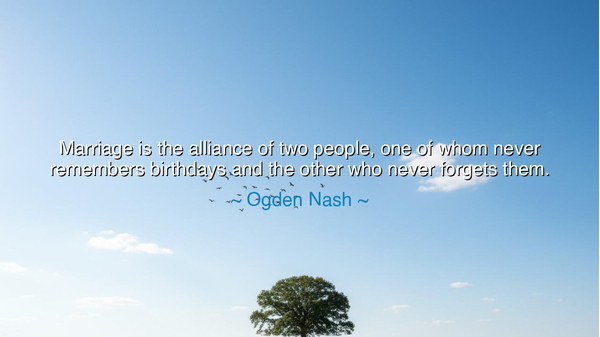
Marriage is the alliance of two people, one of whom never
Marriage is the alliance of two people, one of whom never remembers birthdays and the other who never forgets them.






“Marriage is the alliance of two people, one of whom never remembers birthdays and the other who never forgets them.” Thus quipped Ogden Nash, the poet of wit and gentle satire, who clothed truth in laughter and clothed laughter in wisdom. His words, though light, shine upon a deeper understanding of marriage: that it is not the perfection of two flawless beings, but the union of opposites, the harmony of forgetfulness and remembrance, the balancing of faults and virtues in the crucible of love.
At its heart, Nash’s line is not merely about birthdays, but about the nature of human imperfection. In every marriage, one partner tends toward negligence, the other toward diligence; one is careless, the other careful; one forgets, the other remembers. And it is precisely this interplay—this weaving together of contrasting strengths and weaknesses—that creates the texture of the union. A marriage of two who never remember would collapse into chaos; a marriage of two who never forget would suffocate beneath its own weight. But a marriage of one forgetful and one mindful sustains itself through balance.
The ancients understood this law of opposites. Heraclitus declared that harmony is born of tension, that the bow must be drawn tight for the arrow to fly. So too in love: what appears as conflict—forgetfulness against remembrance—is in fact the dynamic tension that holds the union together. Nash, with humor, points to a truth that philosophers have long proclaimed: the strength of a bond lies not in sameness, but in difference.
History offers us many examples. Consider the marriage of Franklin and Eleanor Roosevelt. Franklin, immersed in politics, strategy, and the burdens of the presidency, often neglected the smaller intimacies of life. Eleanor, steadfast and attentive, remembered causes, people, and details he overlooked. His forgetfulness was matched by her remembrance; his sweeping vision was grounded by her careful attention. Their marriage was not easy, but in the dance of his neglect and her diligence, they built a partnership that changed a nation. Nash’s jest finds echo in their lives: the alliance of opposites became their strength.
But there is also tenderness in his humor. To say that one “never remembers” and the other “never forgets” is to acknowledge the quiet sacrifices of love. The one who remembers bears the burden of care, often unrewarded, while the one who forgets trusts in the grace of the other’s memory. Their alliance is not equal in contribution, but it is equal in devotion, for each gives in different measure. This is the hidden nobility of marriage: to carry the other’s weakness as though it were one’s own.
The lesson, then, is clear: do not despise the imperfections of your partner, but recognize them as the necessary counterpoint to your own. If you are forgetful, be grateful for the one who remembers; if you are the one who remembers, be patient with the one who forgets. In this balance lies the enduring strength of marriage. Happiness is not found in changing the other into yourself, but in learning to love the differences that bind you together.
Practical wisdom follows: in your daily life, notice the opposites between you and your beloved. Instead of quarreling over them, honor them. Celebrate the details your partner never misses, forgive the ones they overlook, and offer your own strengths to cover their weaknesses. When you remember, do so with gentleness; when you forget, do so with humility. In this way, the alliance becomes not a war of differences but a harmony of them.
Thus Ogden Nash, with a poet’s jest, has spoken a truth as old as love itself. Marriage is the alliance of two people, not because they are alike, but because they are different—and it is in the weaving of forgetfulness and remembrance, of weakness and strength, that love is made both bearable and beautiful. Let us then not strive for perfection, but for harmony, cherishing even the birthday forgotten, so long as the bond of the heart is never neglected.






AAdministratorAdministrator
Welcome, honored guests. Please leave a comment, we will respond soon